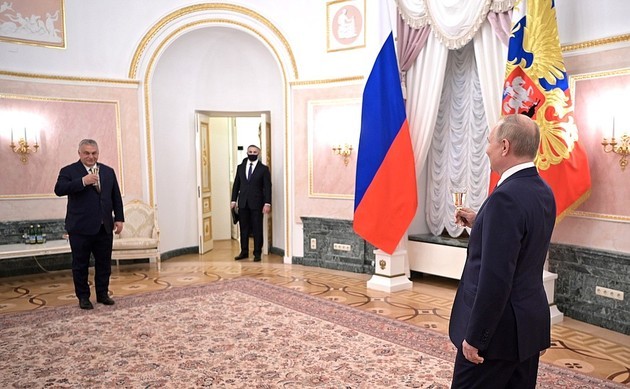In the midst of the anti-Russian hysteria and against the backdrop of the ongoing coronavirus pandemic in Europe, Hungarian Prime Minister Viktor Orban came to Moscow on 1 February (See Hungary balances between Russia and West). In the West, he is often referred as "an ally of Russia and a friend of Putin", EUReporter writes. He seems to take such labels as a compliment and stubbornly follows his line, putting Hungary's interests above all else. What was the agenda in Moscow?
Viktor Orban, of course, acted boldly. After all, he arrived in Moscow at the wrong time. Not to teach or exhort, as it is now customary in the EU and USA, but to calmly and thoroughly study the situation around Ukraine and, most importantly, to expand mutually beneficial cooperation between Russia and Hungary.
While in Moscow Orban stressed that he came “with a peace mission”. Many Russian experts believe that it was initially a ritual excuse addressed to Hungary's Western partners rather than its Russian partners. As a result of his five-hour conversation with President Putin, it became clear that Budapest has its own plans for cooperation with Moscow. The results of the visit have fully proven that.
Viktor Orban was satisfied with President Putin's explanations on the tension around Ukraine. According to Orban, he did not notice Moscow's “aggressive intentions towards Kyiv”. A good remark for Europe and USA overheated by anti-Russian hysteria.
For his part, Orban assured that there are no leaders in the EU who would like a conflict with Russia to arise. Also a bold statement.
Brussels has been working for a long time on plans to punish Russia for the attack on Ukraine that never happened. A former member of the European Union - Great Britain, through the mouth of the scandalous Prime Minister Boris Johnson threaten Moscow with preventive sanctions, they say, "it's better before than after" and actively pump Kyiv with offensive weapons.
It is quite natural that Moscow used high-level contact with the leader of a NATO member country to convey its security concerns.
"We are carefully analyzing the written responses received on January 26 from the United States and NATO. But it is already clear, and I have informed Mr. Prime Minister (Viktor Orban) about this, that Russia's fundamental concerns have been ignored.",- that's what President Putin said.
Orban took note of all this, stressing that "Russia's demands for security guarantees are normal and should be the basis for negotiations”. No doubt that Hungary is committed to its obligations as a member of the NATO Alliance. However, the other day Budapest tactfully evaded Washington's request to host a thousand American soldiers, whom America is going to send to Europe to insure against a virtual “Russian attack" on Ukraine.
In Moscow, Orban once again clearly reiterated his negative approach to economic sanctions imposed on Russia. "The sanctions policy implemented against Russia affected Hungary and caused much more harm. Russia has built import substitution in the areas where we used to supply our goods. As a result we have lost the market."
Of course the expansion of mutual trade and economic cooperation in general was the main topic Prime Minister Orban’s talks with President Putin. "Despite all negative trends due to the pandemic the volume of our mutual trade increased by 30 percent. This is a good signal, major projects are underway, especially the construction of a nuclear power plant," President Putin said.
Hungary now receives natural gas from Russia through the Turkish Stream system, and the contract with Gazprom is concluded until 2036 (in 2021, the country consumed 5.9 billion cubic meters of gas). At the same time, the fuel price for Budapest is set at a significantly lower level than in the rest of Europe. In Moscow, Orban managed to negotiate in principle the increase of gas supplies by another 1 billion. cubic meters. Against the background of a severe energy crisis in the EU, Hungary is clearly in exceptional conditions and has even begun to supply Russian gas via reverse to Ukraine, which will obviously bring additional benefits to the country.
Hungary is planning to launch the production of the Russian vaccine Sputnik V and is already negotiating the supply of Sputnik Lite. During the pandemic, Budapest received 5 million.doses of the Russian vaccine. Hungary is still one of the few states in Europe that preferred not to politicize the issue of recognizing the COVID-19 drug from Russia and successfully use it.
Hungary and Russia have in mind to expand air traffic between the countries in the near future. Cooperation will continue in other areas, including in such an important area for Hungary as rail transport.
There is no doubt that Viktor Orban intends to make full use of his visit to Moscow for his political career, especially with such tangible economic results as a result of his 12th contact with the Russian leader during his career as head of the government. “To be honest, I don't plan to leave politics. There are general elections in the coming April. I'm going to win," Orban stated categorically in Moscow. President Putin, in turn, confirmed that "Moscow is ready to work with any elected leader. But Orban has done a lot in the interests of Hungary and Russia."






